- Home
- Will McIntosh
Faller Page 4
Faller Read online
Page 4
He walked all around the perimeter, marveling at the breathtaking view, with Orchid trailing a few paces behind him, hands on her hips. The world seemed even smaller from up there, its cigar shape evident. He could trace the edge all the way around, could see every building, their heights flattened by the perspective. Even the scorched field of rubble at the far end of the world looked beautiful, somehow. It wasn’t often one was high enough to truly appreciate how small the world was, hanging there in the enormous blue sky. It made you feel tiny—a speck on an insignificant speck.
When he was finished enjoying the view, Faller looked down again.
What had he been thinking? He couldn’t jump from here.
He’d considered working his way up to the Tower slowly—jumping from the roof of a six-story building, then ten, then fifty. But he hadn’t seen any point. Once he got much above eight stories, all the mattresses in the world wouldn’t save him if the parachute failed.
In theory, jumping from this height wasn’t much more complicated than jumping from a five-story building. But he realized now that the technical aspect was only part of the jump; there was also the psychological to consider.
“Can we go home now?” Orchid asked.
Faller pulled the toy paratrooper out of his pack and set it on the ledge.
“You little fucker. What have you gotten me into?” It was apropos that a toy had inspired this entire endeavor.
The webbing that ran from elbow to waist on the paratrooper puffed out, blown by a heavy gust, and it fell over.
If he didn’t jump, he’d have to look Daisy in the eye and tell her she’d have to go ahead and starve, because he was afraid.
He turned to look at Orchid. “I have to do it.”
“I understand. I love you. I always have.” The wind muffled her words.
“You’re acting as if I’m already gone. Jelly on the pavement. Have a little faith.” He lifted his arms, flapped them, trying to lighten the mood, maybe give himself some courage.
Orchid didn’t laugh. She stepped close and gave him a fierce hug.
“See you soon,” he said.
He could see the people below—speckles mottling the street and sidewalk, waiting, watching.
Experimentally, he sat on the low ledge, swung his feet out over empty space. It took all of his willpower to keep from throwing himself back to the safety of the roof.
The wind was hard, gusting on and off unpredictably. Could a gust blow him into the side of the building before he got his chute open? He’d have to open it very quickly, then use the webbing on his jumpsuit to coax himself away from the wall.
The image calmed his pounding heart. He could drift on the breeze, the parachute a protective canopy above his head. He took a deep breath, looked out at the clouds passing, so impossibly huge and bright. Willing himself to keep his gaze out instead of down, he stuffed the paratrooper into his pocket, then drew his feet under him until he was squatting on the wall.
A few deep breaths, then, arms outstretched for balance, he stood.
The wind nudged him backward; he leaned into it to regain his footing. It stopped suddenly and he lurched forward, almost falling, his heart tripping madly. He grinned at his terror. Falling was the whole point.
“Jump,” he said aloud. “Go ahead, goddammit. Just jump.”
Faller coiled, tensed, glanced down at the street.
This was madness. It was too high; the restraints of his own sanity would never allow him to leap from this height.
He climbed off the wall. Orchid, who’d been squatting a dozen feet behind him, stood, her eyebrows raised.
Any way he looked at it, he was a dead man. There was no way he could survive that jump, and if Biter didn’t kill him, starvation would.
“Fuck it,” he said. He climbed back onto the wall. If he was going to die anyway, why not die in style?
Without allowing himself time to think, he jumped.
Everything inside him clenched. His hands in fists, his jaw clamped, Faller tumbled forward. It gave him a terrible full-on view of the street so far below. He kept rolling until he was plummeting headfirst, the glass exterior of the Tower passing upside down in a blur. He was falling way too fast, faster than he’d imagined possible. His jumpsuit flapped so hard it was like being slapped.
As he tumbled back upright he remembered the chute. He reached back and yanked open the Velcro-fastened flap of the backpack in one swift, well-practiced motion. The chute flew out, followed by the six suspension lines. He squeezed his eyes shut, braced for a yank on his harness so jarring it might break his neck.
He felt a jerk that slowed him momentarily, then he kept falling. Above him, the chute snapped frantically in the wind. He opened one eye, peered up at the chute, and screamed.
Only four of the suspension lines were attached. Two others were twisting around each other uselessly. The collapsed chute was doing nothing to slow his fall.
Frantically, he began pulling everything toward him, to try to reconnect it before he hit the ground, although the tiny sliver of his mind that was still rational knew it was hopeless. It was over; he was dead. He was going to slam to the pavement, then everything would go black. They would have a funeral and roll him off the edge and his body would fall forever.
His fingers froze on the lines as a glimmer of hope broke through his terror. Unless he went off the edge. He’d seen birds gliding on the wind with their wings spread. Could he do the same? He released the suspension lines, gauged the distance to the edge as he stretched his arms and legs into an X.
It worked; he drifted away from the Tower. But what was the point? If he made it, he would still die. Maybe it was best to get it over with quickly.
Arms and legs still spread, he coaxed his body to glide horizontally on the buffeting wind. The force of it nearly flipped him; he tipped left, then right, struggling to keep his arms from being thrown out of place. The fabric of his jumpsuit flapped wildly as the city glided by beneath him even as it rose toward him, growing larger and better defined by the second. The wind was deafening—a vertical hurricane that jerked and bounced him.
This was madness. Dying would be easier than hurtling into the void. He’d lose his mind long before he died of thirst. Yet he couldn’t bring himself to give up, to draw his limbs into a cannonball and let the pavement have him.
His shoulders were burning from the strain as he reached out toward the edge of the world, his arms wide, his fingers splayed as if he could claw his way to it.
In the streets below, some of the tiny figures had broken from the crowd and were headed toward the edge, following his trajectory. Too late, he realized another skyscraper was between him and the edge. Faller twisted as he hurtled toward the glass face of it, changing his trajectory. He glided at an angle to the skyscraper, missed slamming into it by a matter of a dozen feet as he dropped toward a strip of black rooftops—a row of tenements that hung over the edge.
For the briefest instant he caught sight of people sprinting into the open, their heads craned upward, tracking him.
He strained, trying to squeeze every last inch of vertical movement out of the webbing as the roof expanded. He could see detail—satellite dishes set along the roof, a wooden water tower. At the last instant he threw his arms over his face and squawked in terror, his whole body flinching as he hurtled toward one last lousy span of roof.
A bright burst of pain lanced his foot as it caught the edge of the roof and sent him spinning end over end, his field of vision filled alternately by red brick, blue sky, then black rock until, pinwheeling his arms wildly, he stopped flipping.
He kept falling, though.
The world slid past as his heart hammered, his mouth cranked wide in a silent, breathless scream.
I
PETER DRAGGED his hand through his hair as he studied the tissue sections and sequences. His hair was oily as hell, because he hadn’t showered in three days. The data, however, were clean and beautiful. The tuberculosis-riddle
d human lung had come through the duplicator unaltered; the duplicate lung was genetically identical to the original, right down to epigenetic mutation, only it was free of Tuberculosis-8.
“Beautiful,” he said.
“I know, isn’t it?” Harry Wong said, grinning.
Someone had a radio on nearby, tuned to an oldies station playing “Open Arms,” by Journey. It seemed unlikely background music for a monumental scientific breakthrough.
As techs and colleagues passed, some brushing against Peter in the tight maze of lab islands, Peter scrolled to the last page of the printout, which summarized the results.
“It’s all good, Doc. Right down to the fine print,” Harry said.
Peter looked up. “Did you just call me Doc?”
Harry gave Peter a big, toothy, semisarcastic grin. “Yes, I did.”
“No. Don’t even think about it.” Peter pointed his pen at Harry’s face. “In grad school you had just about everyone calling me Sandy.” Lowering the pen, he closed the printout. “We’re weeks away from being able to provide workable replacement organs. Can you believe this?”
“It’s pretty damned unbelievable,” Harry said.
Peter held out his hand to Harry, palm up. Harry gave him a quizzical look.
“Will you dance with me?” Peter took Harry’s hands and danced him between the lab stations.
“You drink too much Zing again?” Harry asked, somewhat reluctantly moving his hips to the music.
“Yeah. Probably.” Peter did feel awfully full of pep and verve.
“Don’t you dare twirl me,” Harry said, as people began to notice, and laughter rose around the lab.
The thing was, when would Ugo’s team be ready with the radical transplant procedure? If they couldn’t get infected organs out and clean duplicate organs back in quickly and economically, not enough of the infected would benefit from this breakthrough.
“Have you seen an update on infection rates today?” he asked Harry.
Harry stopped dancing. “You don’t want to see them. The Peterson-Jantz prion is out of control in the Ukraine and Romania. TB-8 has crossed into Nepal and Bangladesh.”
“Shit.” A now familiar jangling dread hit Peter, dampening his high spirits. “Damn Saudi Arabia’s lying ass.”
And Saudi Arabia wasn’t even one of the combatants. They’d lied and lied about the extent of their oil reserves, and finally left India high and dry. If not for them India wouldn’t have thrown trillions of rupees at Mozambique to effectively steal Russia’s stake in Mozambique’s natural gas production.
Everyone had been afraid Russia would respond with military force. Instead, surprise—they released a deadly disease on India. Insanity had reached a new height.
“Harry? Can I borrow you?” Jill Sanders called from four or five stations away.
Harry patted Peter’s back. “Nice work, Doc. Want to celebrate tonight?”
“Sounds good. I’ll see if Melissa’s free. And if you call me Doc again I’m going to cut your salary in half.”
“It’s never just the guys anymore,” Harry said, raising his voice over the din of the lab as he walked away. “You always have to bring the wife along.”
“What are you talking about? You like her more than you like me.”
“You got that right,” Harry shouted.
Navigating islands of equipment, Peter headed back to his workspace, sectioned off from the rest of the vast floor by three semitransparent walls that began at knee level and ended a foot above Peter’s head, the fourth wall a window that faced a fifty-foot-wide swatch of lawn sitting between their lab and a crumbling factory building. The light was fading, lending an ominous tinge to the aged and broken building. The plan had been to eventually convert all of the old factory buildings to labs as part of the Cross-pollination Project, but only four had been completed.
Squatting, Peter opened his minifridge, pulled another bottle of Zing energy drink from row upon row that filled the fridge. He was about to slam the fridge door closed when he noticed interlopers.
Three squareish plastic bottles were tucked toward the back of the far right row of roundish Zing bottles. Peter pulled one out and examined it. It was a seaweed-colored liquid called Green Goodness, a “drinkable army of fruits and vegetables, packed with antioxidants, vitamins A and C.”
Chuckling, Peter set it back in the fridge. Melissa strikes again. All she ever drank was diet Sprite, yet she worried about Peter getting enough nourishment.
Over the general din of the lab, Peter heard burbling near the ceiling, among the rusted steel beams that were part of the original World War II artillery factory. Pigeons in the rafters again. He didn’t mind them, but they drove Ugo nuts. The guy hated animals. He would deny it to the end, especially if Izabella—his animal-loving wife, sister of the provider of Green Goodness—was with him, but you could see him growing irritable when an animal was nearby, except when it was being served to him on a bed of rice.
“Dr. Sandoval?”
Peter went to his door, smiled at the tech standing near the duplicator with a screen open, data flashing across it. “Hey, Arthur. What’s up?”
“It didn’t work,” Arthur said.
Peter only glanced at the two identical human livers laid out on a wheeled medical cart near the delivery ducts before diving into the numbers. He was a theoretical physicist; it would be Ugo’s job to examine the livers themselves.
“Wasn’t fooled, eh?” Peter asked, scanning the data. No matter how cleverly they tried to disguise foreign bodies as part of a biological entity, or make cells in a biological entity appear to be foreign bodies, they couldn’t fool the duplicator. The results provided fascinating clues about the nature of his duplicator, about what was going on when they sent something through the miniature wormhole, but in terms of being able to produce a cancer-free, rejectionproof replacement liver for people suffering from liver cancer, the experiment was a bust.
The big double doors leading into their lab swung open. Ugo breezed in wearing his inevitable Panama hat and a black blazer.
Peter waved to get his attention.
“Which experiment is this?” Ugo asked, bending over to examine one of the livers, breathing heavily through his nose.
“Part of the masking series. It didn’t work.” He led Ugo away, toward Harry’s station. “More importantly, though”—Peter paused for dramatic effect—“we’ve got a duplicate lung completely clear of TB-8.”
Ugo let out an uncharacteristic bark of laughter. “It’s clear?”
“Completely.”
Ugo examined the lung, then looked at a cross section under a microscope. When he was satisfied, he lifted his head and breathed, “We did it.”
Peter held up his hand for a high five; Ugo eyed it with impatience, then stuck out his hand, offering to shake.
Relenting, Peter shook. “Harry and I were talking about a celebration dinner tonight. Are you and Izabella free?”
Ugo tilted his head. “As far as I know. I’ll check with Izabella.” He clapped Peter on the shoulder. “Shall we walk?”
Without waiting for an answer, Ugo bounded toward his office to retrieve the flashlights. Peter followed less buoyantly. Walking was a major pastime in Serbia, evidently, but Peter would just as soon take a morning drive.
Handing Peter a flashlight, Ugo led the way down the long hall, as Peter struggled to match the man’s long, sweeping strides. Peter wondered if the techs joked that he and Ugo looked more like a comedy team than a pair of scientists, with Ugo so tall and beefy, Peter short and slim.
Honestly, they didn’t have much more in common on the inside. Ugo’s adopted father was a retired general, while Peter’s father had driven a school bus and cooked meth, at least until he blew their home up during a cook. Ugo collected rare wine, golfed, was a connoisseur of gourmet chocolate, listened to string quartets, and wore Panama hats and burgundy cravats. Peter listened to death metal, wore T-shirts, and was an avid cloud watcher.
> They switched on their flashlights as they pushed past the steel door that led down into the darkness—into the seemingly endless, twisting bowels of the old factory, mostly built below ground to repel an air attack.
It was the compromise that made the daily walk palatable to Peter: if he was going to walk, he wanted to explore the dark corridors of the factory, rather than circle the walking trail that ringed the facility outside. The factory never ceased to surprise, with another cellar, a stairway you hadn’t noticed before. A few floors below them was the main factory floor: iron machines as big as locomotives, great wheels coming out of the floor, silver pipes snaking up the walls and disappearing into the ceiling. It was beautiful in the way forgotten, obsolete things could be.
“Now we have to get a handle on Peterson-Jantz,” Ugo said as they whisked along the familiar corridor that led out of the locker room at the bottom of the stairwell, into the factory proper. “I think I’m close to understanding why the Woolcoff Virus’s prion-suppressing properties affect memory as well.”
Peter made an encouraging sound. Affect memory as well? The virus completely obliterated subjects’ biographical memory, and damaged semantic memory as well, leaving them barely able to function. The Peterson-Jantz prion was forced into stasis, yes, but at an outrageous cost. Prions were disease-causing versions of proteins that were found in nervous system cells, so they targeted the brain, making Peter’s duplicator no help. You couldn’t transplant a brain.
“I think I can isolate the problem in another six months,” Ugo continued.
The corridor opened onto the factory floor: a maze of conveyor belts, hooks, oil stains, catwalks. Stacks of cardboard boxes lined one wall, emergency supplies in case they were ever forced into emergency lockdown.
There was a howling sense of loss in this place that used to be packed with rough-handed workers, sweating on the night shift, carrying out vein-bulging work to the deafening rhythm of machines. Peter loved the gritty feel of it. With everything he’d accomplished, he could easily get funding for his own shiny new facility, but he’d grown fond of this place. He liked being around the best and brightest minds from a cross section of fields.

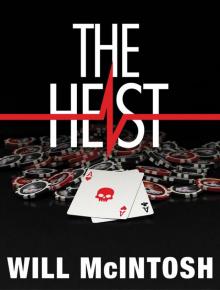 The Heist
The Heist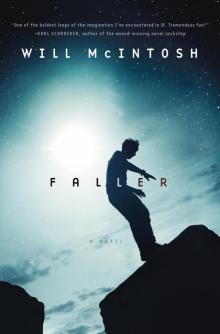 Faller
Faller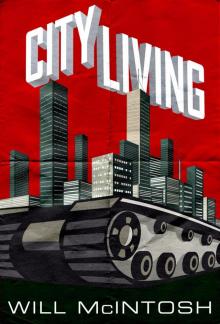 City Living
City Living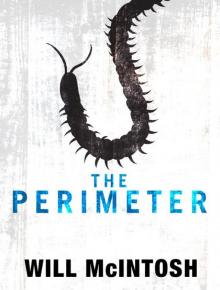 The Perimeter
The Perimeter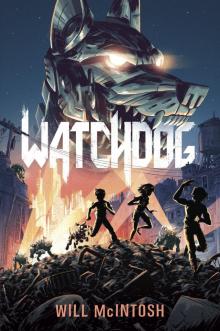 Watchdog
Watchdog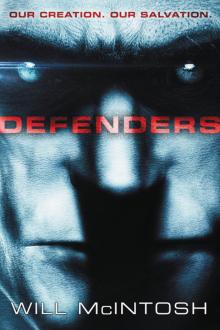 Defenders
Defenders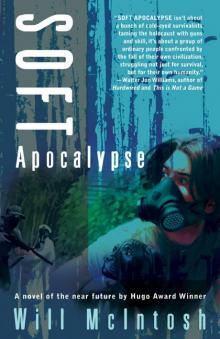 Soft Apocalypse
Soft Apocalypse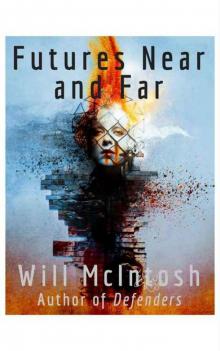 Futures Near and Far
Futures Near and Far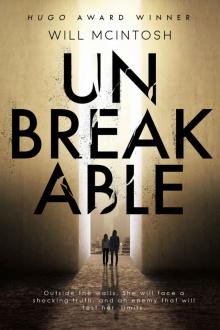 Unbreakable
Unbreakable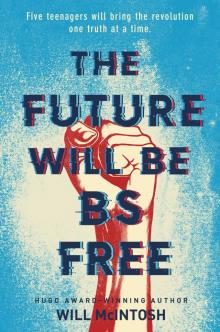 The Future Will Be BS Free
The Future Will Be BS Free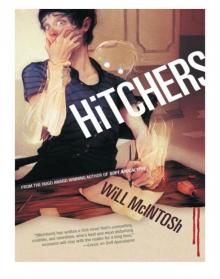 Hitchers
Hitchers Burning Midnight
Burning Midnight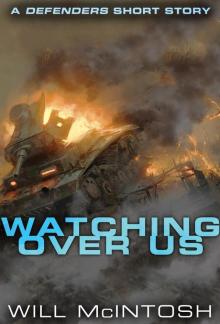 Watching Over Us
Watching Over Us